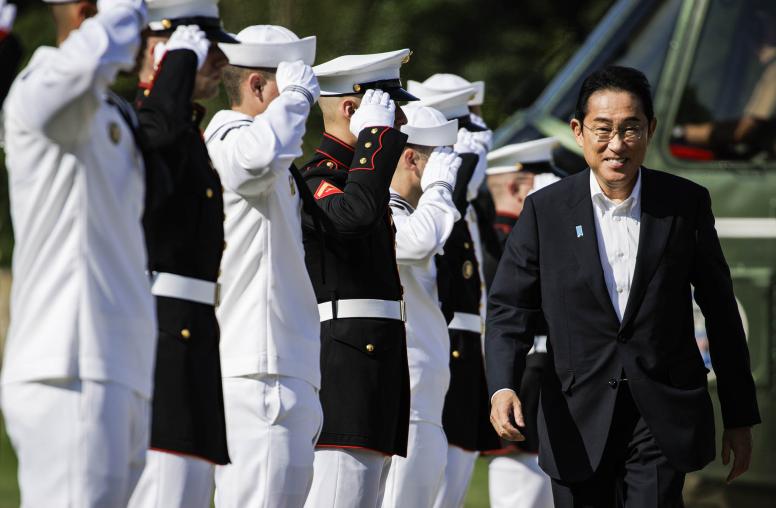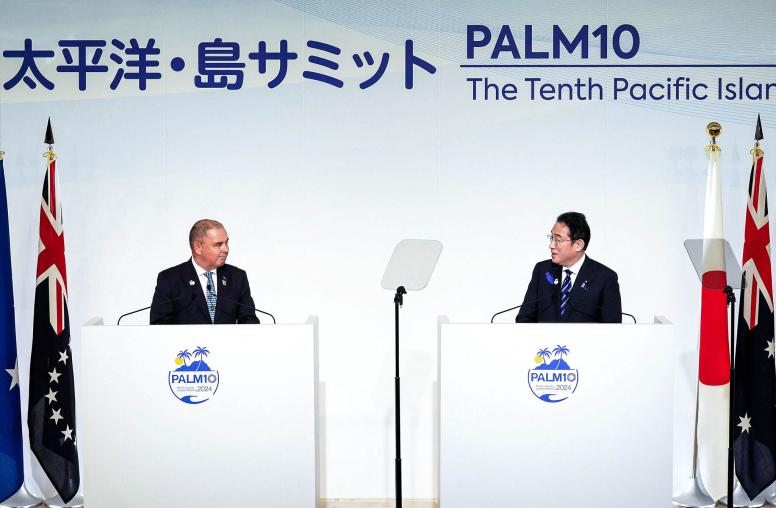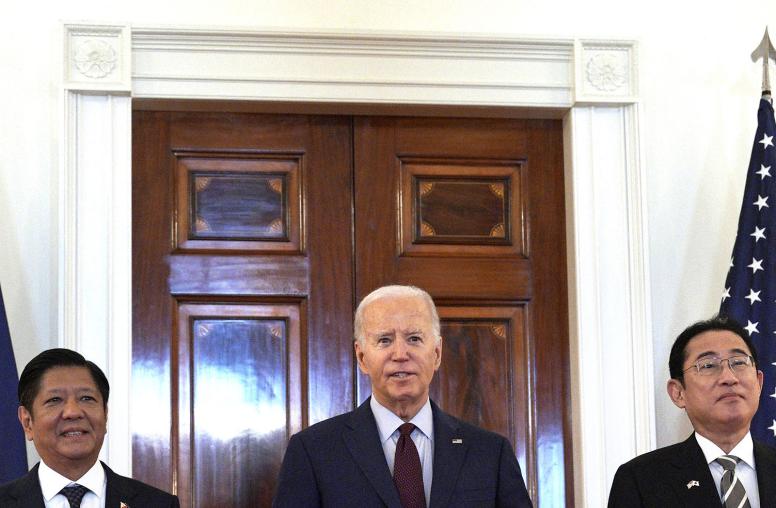What to Expect from the Trilateral Summit with Japan and South Korea
The U.S. is seeking a more integrated security network with its allies in the Indo-Pacific.
After months of steadily increasing diplomatic exchanges — and a historic thaw in tensions between South Korea and Japan — President Joe Biden will host Japanese Prime Minister Fumio Kishida and South Korean President Yoon Suk Yeol at Camp David for a trilateral summit on August 18. The three leaders have previously met on the sidelines of larger multilateral forums, such as last year’s NATO summit, but the Camp David meeting marks the first standalone leader-level summit between the three countries.

Past talks have primarily dealt with the Korean Peninsula, and the agenda for the Camp David summit will undoubtedly feature renewed discussions of North Korea. However, in a sign of deepening defense cooperation, the three leaders will also confer on broader security issues in the Indo-Pacific, such as China’s more assertive role in the Indo-Pacific and the precarious condition of the rules-based international order amid Russia’s invasion of Ukraine.
USIP’s Frank Aum, Mirna Galic and Kemi Adewalure discuss what to expect from the summit, how China, North Korea and Russia have reacted, and whether this uptick in cooperation is sustainable amid ongoing historical disputes between South Korea and Japan.
Why is this meeting important and what does it indicate about South Korea-Japan ties?
Adewalure: The summit is the first in what the Biden administration hopes will become an annual series, indicating a new path of deepening engagement for the trilateral relationship, consistent with the U.S. Indo-Pacific Strategy’s focus on helping U.S. allies in the region strengthen their ties with one another.
Relations between Japan and South Korea have improved since South Korean President Yoon Suk Yeol made an effort early in his administration to ease tensions with Tokyo, which led to a historic bilateral summit in March.
However, despite the historic summit and the unifying effect of North Korea’s record number of missile launches, relations between the two countries remain complicated — especially given consistent public sentiment in South Korea that sees Yoon’s dealings with Tokyo as a one-sided capitulation for the sake of mended ties. Also, four of the fifteen victims of Japanese forced labor recognized by the South Korean Supreme Court continue to refuse compensation payments from the fund that President Yoon established to improve relations with Japan.
It is unclear whether the court will allow these four claimants to instead receive compensation through the assets of Japanese companies, as two 2018 South Korean Supreme Court rulings declared was required. If this happens, either under Yoon’s term or during the tenure of a future South Korean president who is more partial to the victims’ concerns, then Japan-South Korea ties could, again, sour quickly.
The Biden administration may hope that institutionalizing relations in a trilateral format and creating regularized mechanisms such as annual meetings and joint exercises can create a support structure for relations going forward even if political winds within Seoul or Tokyo shift.
What outcomes are expected at the summit?
Aum: The United States, South Korea and Japan are expected to discuss and announce plans for stronger trilateral cooperation on a range of security initiatives, including ballistic missile defense, joint military exercises and cybersecurity directed at threats posed by North Korea, China and Russia.
With both trilateral and bilateral meetings scheduled for the summit, the United States is looking to institutionalize security progress made by the three countries over the last year. Since taking power in May 2022, the Yoon administration has emphasized improving relations with Japan and strengthening deterrence against the North Korean nuclear threat. The Biden administration has capitalized on Yoon’s approach by reinforcing trilateral cooperation, including through convening leader summits on the sidelines of multilateral events and reinvigorating joint military exercises.
At Camp David, the United States will seek to establish annual trilateral summits as well as an agreement that the three countries will engage in mutual consultation in the case of an attack or crisis. Washington will also advance efforts to share missile defense information in real-time and conduct additional anti-submarine exercises. These measures would move the three countries, but especially South Korea and Japan, closer to the type of integrated security network that Washington believes is necessary to advance their shared goals in the Indo-Pacific region.
By hosting the summit at an extraordinary — yet more casual — venue like Camp David, the United States wants to emphasize that it strongly supports the improvement in South Korea-Japan ties, that the relationship must continue to be future-oriented rather than bogged down by historical disputes, and that the summit itself will be a watershed moment in both Japan-South Korea and trilateral relations. In the past, Camp David has hosted historic events among world leaders, including Jimmy Carter gathering Menachem Begin and Anwar al-Sadat to strike an Israel-Egypt peace deal in 1978.
What does the summit indicate regarding U.S. policy toward the Korean Peninsula and the Indo-Pacific more broadly?
Galic: The summit signals the strengthening of two main efforts for the region supported by all three partners: deterrence (primarily vis-à-vis North Korea, but also touching on China) and cooperation (to help regional partners in ASEAN as well as the Pacific Islands). Both of these were previewed in the November 2022 Phnom Penh Statement and will likely to be fleshed out at the summit.
Greater unity between Japan, South Korea and the United States is itself a deterrent, but trilateral cooperation will also encompass specific areas relevant for deterrence that need to be further discussed and implemented, such as a three-way hotline for crises. Additionally, the leaders will underscore a united front against any change in the status quo by force, which is important not only for Taiwan, but also in the East and South China seas, where China has most recently stirred tensions with the Philippines.
The broader Indo-Pacific will also benefit from trilateral cooperation that moves away from an exclusive focus on the Korean Peninsula and into areas like better support for ASEAN and Pacific Islands states. At a trilateral meeting of the three countries’ chief diplomats in September 2022, officials discussed the necessity of bolstering their engagement with ASEAN, which will likely include supporting implementation of the ASEAN Outlook on the Indo-Pacific, the bloc’s Indo-Pacific strategy. They also pledged to look for more ways to coordinate and build on one another’s efforts to support Pacific Island states in areas such as climate change mitigation and adaptation, as well as relevant financing. The summit may help concretize agendas for both sets of initiatives.
What does this mean for China, Russia and North Korea?
Adewalure: China, Russia and North Korea will not be happy with the summit’s call for cooperation — but for various reasons.
For North Korea, the summit reinforces its perception that the United States wants to develop a NATO-like military alliance in the region that is hostile to Pyongyang’s security interests. It is possible that the summit could spur North Korean military demonstrations, like long-range missile tests, or more displays of North Korea-China-Russia unity, as was seen in late July when Russian Defense Minister Sergei Shoigu and Chinese Communist Party Politburo member Li Hongzhong joined Kim Jong Un at a military parade in Pyongyang to celebrate the 70th anniversary of the end of the Korean War, known there as the Day of Victory in the Great Fatherland Liberation War.
Beijing also perceives the strengthening of U.S. alliances in the region as anti-China. China wants the two U.S. allies to seek “strategic autonomy” by setting their policies for themselves, rather than what it sees as South Korea and Japan following America’s lead. The summit is expected to generate additional language on Taiwan in support of the status quo and peace across the Taiwan Strait, building on the language in the Phnom Penh Statement, which China generally views as interfering in what it sees as a domestic affair.
Moreover, the summit will address how the war in Ukraine is undermining the rules-based international order to the detriment of not only the Euro-Atlantic, but also the Indo-Pacific region, where use of force to change the status quo, for example on Taiwan, is already a concern. The partners will likely discuss further support for Ukraine and condemn Russia’s aggression. The United States has previously asked South Korea to consider sending weapons to Ukraine, something Seoul has so far resisted and which Russia has warned South Korea against.
Kemi Adewalure is a program assistant with USIP’s China and Northeast Asia team.



